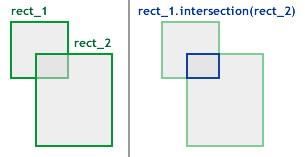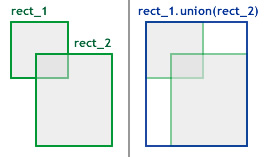A Rectangle object is an area defined by its position, as indicated by its top-left corner point(x, y) and by its width and its height.
The x, y, width, and
height properties of the Rectangle class are independent of
each other; changing the value of one property has no effect on the others.
However, the right and bottom properties are
integrally related to those four properties. For example, if you change the
value of the right property, the value of the
width property changes; if you change the bottom
property, the value of the height property changes.
The following methods and properties use Rectangle objects:
- The
applyFilter(),colorTransform(),copyChannel(),copyPixels(),draw(),fillRect(),generateFilterRect(),getColorBoundsRect(),getPixels(),merge(),paletteMap(),pixelDisolve(),setPixels(), andthreshold()methods, and therectproperty of the BitmapData class - The
getBounds()andgetRect()methods, and thescrollRectandscale9Gridproperties of the DisplayObject class - The
getCharBoundaries()method of the TextField class - The
pixelBoundsproperty of the Transform class - The
boundsparameter for thestartDrag()method of the Sprite class - The
printAreaparameter of theaddPage()method of the PrintJob class
You can use the new Rectangle() constructor to create a
Rectangle object.
Note: The Rectangle class does not define a rectangular Shape
display object. To draw a rectangular Shape object onscreen, use the
drawRect() method of the Graphics class.
See also:
Constructor
new(x:Float = 0, y:Float = 0, width:Float = 0, height:Float = 0)
Creates a new Rectangle object with the top-left corner specified by the
x and y parameters and with the specified
width and height parameters. If you call this
function without parameters, a rectangle with x,
y, width, and height properties set
to 0 is created.
Parameters:
x | The x coordinate of the top-left corner of the rectangle. |
|---|---|
y | The y coordinate of the top-left corner of the rectangle. |
width | The width of the rectangle, in pixels. |
height | The height of the rectangle, in pixels. |
Variables
bottomRight:Point
The location of the Rectangle object's bottom-right corner, determined
by the values of the right and bottom properties.

height:Float
The height of the rectangle, in pixels. Changing the height value of
a Rectangle object has no effect on the x, y, and width
properties.

left:Float
The x coordinate of the top-left corner of the rectangle. Changing
the left property of a Rectangle object has no effect on the y and
height properties. However it does affect the width property,
whereas changing the x value does not affect the width property.
The value of the left property is equal to the value of the x
property.

size:Point
The size of the Rectangle object, expressed as a Point object with the
values of the width and height properties.
top:Float
The y coordinate of the top-left corner of the rectangle. Changing
the top property of a Rectangle object has no effect on the x and
width properties. However it does affect the height property,
whereas changing the y value does not affect the height
property.
The value of the top property is equal to the value of the y
property.

topLeft:Point
The location of the Rectangle object's top-left corner, determined by the x and y coordinates of the point.

width:Float
The width of the rectangle, in pixels. Changing the width value of a
Rectangle object has no effect on the x, y, and height
properties.

x:Float
The x coordinate of the top-left corner of the rectangle. Changing
the value of the x property of a Rectangle object has no
effect on the y, width, and height
properties.
The value of the x property is equal to the value of the
left property.
y:Float
The y coordinate of the top-left corner of the rectangle. Changing
the value of the y property of a Rectangle object has no
effect on the x, width, and height
properties.
The value of the y property is equal to the value of the
top property.
Methods
clone():Rectangle
Returns a new Rectangle object with the same values for the
x, y, width, and
height properties as the original Rectangle object.
Returns:
A new Rectangle object with the same values for the
x, y, width, and
height properties as the original Rectangle object.
contains(x:Float, y:Float):Bool
Determines whether the specified point is contained within the rectangular region defined by this Rectangle object.
Parameters:
x | The x coordinate (horizontal position) of the point. |
|---|---|
y | The y coordinate (vertical position) of the point. |
Returns:
A value of true if the Rectangle object contains the
specified point; otherwise false.
containsPoint(point:Point):Bool
Determines whether the specified point is contained within the rectangular
region defined by this Rectangle object. This method is similar to the
Rectangle.contains() method, except that it takes a Point
object as a parameter.
Parameters:
point | The point, as represented by its x and y coordinates. |
|---|
Returns:
A value of true if the Rectangle object contains the
specified point; otherwise false.
containsRect(rect:Rectangle):Bool
Determines whether the Rectangle object specified by the rect
parameter is contained within this Rectangle object. A Rectangle object is
said to contain another if the second Rectangle object falls entirely
within the boundaries of the first.
Parameters:
rect | The Rectangle object being checked. |
|---|
Returns:
A value of true if the Rectangle object that you
specify is contained by this Rectangle object; otherwise
false.
copyFrom(sourceRect:Rectangle):Void
Copies all of rectangle data from the source Rectangle object into the calling Rectangle object.
Parameters:
sourceRect | The Rectangle object from which to copy the data. |
|---|
equals(toCompare:Rectangle):Bool
Determines whether the object specified in the toCompare
parameter is equal to this Rectangle object. This method compares the
x, y, width, and
height properties of an object against the same properties of
this Rectangle object.
Parameters:
toCompare | The rectangle to compare to this Rectangle object. |
|---|
Returns:
A value of true if the object has exactly the same
values for the x, y, width,
and height properties as this Rectangle object;
otherwise false.
inflate(dx:Float, dy:Float):Void
Increases the size of the Rectangle object by the specified amounts,
in pixels. The center point of the Rectangle object stays the same,
and its size increases to the left and right by the dx value, and to
the top and the bottom by the dy value.
Parameters:
dx | The value to be added to the left and the right of the Rectangle object. The following equation is used to calculate the new width and position of the rectangle: |
|---|---|
dy | The value to be added to the top and the bottom of the Rectangle. The following equation is used to calculate the new height and position of the rectangle: |
inflatePoint(point:Point):Void
Increases the size of the Rectangle object. This method is similar to
the Rectangle.inflate() method except it takes a Point object as a
parameter.
The following two code examples give the same result:
var rect1 = new Rectangle(0,0,2,5);
rect1.inflate(2,2);var rect1 = new Rectangle(0,0,2,5);
var pt1 = new Point(2,2);
rect1.inflatePoint(pt1);Parameters:
point | The |
|---|
intersection(toIntersect:Rectangle):Rectangle
If the Rectangle object specified in the toIntersect parameter
intersects with this Rectangle object, returns the area of
intersection as a Rectangle object. If the rectangles do not
intersect, this method returns an empty Rectangle object with its
properties set to 0.

Parameters:
toIntersect | The Rectangle object to compare against to see if it intersects with this Rectangle object. |
|---|
Returns:
A Rectangle object that equals the area of intersection. If
the rectangles do not intersect, this method returns an empty
Rectangle object; that is, a rectangle with its x, y,
width, and height properties set to 0.
intersectionToOutput(toIntersect:Rectangle, output:Rectangle):Rectangle
If the Rectangle object specified in the toIntersect parameter
intersects with this Rectangle object, returns the area of
intersection as a Rectangle object. If the rectangles do not
intersect, this method returns an empty Rectangle object with its
properties set to 0.

Parameters:
toIntersect | The Rectangle object to compare against to see if it intersects with this Rectangle object. |
|---|---|
output | An optional Rectangle to be used as the output value, avoiding the creation of a new object |
Returns:
A Rectangle object that equals the area of intersection. If
the rectangles do not intersect, this method returns an empty
Rectangle object; that is, a rectangle with its x, y,
width, and height properties set to 0.
intersects(toIntersect:Rectangle):Bool
Determines whether the object specified in the toIntersect
parameter intersects with this Rectangle object. This method checks the
x, y, width, and
height properties of the specified Rectangle object to see if
it intersects with this Rectangle object.
Parameters:
toIntersect | The Rectangle object to compare against this Rectangle object. |
|---|
Returns:
A value of true if the specified object intersects
with this Rectangle object; otherwise false.
isEmpty():Bool
Determines whether or not this Rectangle object is empty.
Returns:
A value of true if the Rectangle object's width or
height is less than or equal to 0; otherwise false.
offset(dx:Float, dy:Float):Void
Adjusts the location of the Rectangle object, as determined by its top-left corner, by the specified amounts.
Parameters:
dx | Moves the x value of the Rectangle object by this amount. |
|---|---|
dy | Moves the y value of the Rectangle object by this amount. |
offsetPoint(point:Point):Void
Adjusts the location of the Rectangle object using a Point object as a
parameter. This method is similar to the Rectangle.offset()
method, except that it takes a Point object as a parameter.
Parameters:
point | A Point object to use to offset this Rectangle object. |
|---|
setEmpty():Void
Sets all of the Rectangle object's properties to 0. A Rectangle object is empty if its width or height is less than or equal to 0.
This method sets the values of the x, y,
width, and height properties to 0.
setTo(xa:Float, ya:Float, widtha:Float, heighta:Float):Void
Sets the members of Rectangle to the specified values.
Parameters:
xa | The x coordinate of the top-left corner of the rectangle. |
|---|---|
ya | The y coordinate of the top-left corner of the rectangle. |
widtha | The width of the rectangle, in pixels. |
heighta | The height of the rectangle, in pixels. |
union(toUnion:Rectangle):Rectangle
Adds two rectangles together to create a new Rectangle object, by filling in the horizontal and vertical space between the two rectangles.

Note: The union() method ignores rectangles with 0 as the
height or width value, such as: var rect2:Rectangle = new Rectangle(300,300,50,0);
Parameters:
toUnion | A Rectangle object to add to this Rectangle object. |
|---|
Returns:
A new Rectangle object that is the union of the two rectangles.
unionToOutput(toUnion:Rectangle, output:Rectangle):Rectangle
Adds two rectangles together to create a new Rectangle object, by filling in the horizontal and vertical space between the two rectangles.

Note: The union() method ignores rectangles with 0 as the
height or width value, such as: var rect2:Rectangle = new Rectangle(300,300,50,0);
Parameters:
toUnion | A Rectangle object to add to this Rectangle object. |
|---|---|
output | An optional Rectangle to be used as the output value, avoiding the creation of a new object |
Returns:
A new Rectangle object (or the object passed in as the output parameter, if not null) that is the union of the two rectangles.